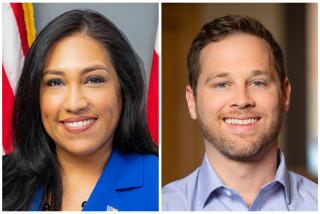Roberti Tells Reason for Gun Decision
- Share via
After seven years of glowering combat with Republican Gov. George Deukmejian, Senate President Pro Tem David A. Roberti is trying to make peace this year--in the hopes it will lead to some bipartisan policy advances, the Los Angeles Democrat told a group of political reporters Friday.
In that spirit, Roberti told the breakfast gathering in Los Angeles, he agreed with a “terribly unorthodox” last-minute Deukmejian demand to delay’s Thursday’s scheduled Senate passage of a bill to slap a ban on the sale of semiautomatic assault weapons.
“It certainly wouldn’t be the right way to have a successful policy year by jamming the governor with a bill,” Roberti explained.
Deukmejian has said he would support a ban on the sale of new assault weapons if it was fashioned to avoid confusion and to protect sale and ownership of sporting arms.
Still Optimistic
Despite this surprise delay until next week, Roberti described himself as still optimistic that Deukmejian would make his last-minute review of the terms of the proposed controls and then welcome the bill to his desk. Roberti said he believed the postponement would allow Deukmejian to hear one more perfunctory round of opposition appeals from those opposed to any controls on the weapons, principally the National Rifle Assn. and its allies.
“He will hear these people out. He may make some suggestions for changes. . . . (But) I don’t think he would go through this whole rigmarole only to make impossible demands at the end,” Roberti said.
The Senate leader also touched on other ticklish subjects for Democrats--laundered drug money, tax increases and the return to politics of Edmund G. (Jerry) Brown Jr.
Drug money laundering is a subject in Democratic politics because of the arrest of longtime Democratic Party fund raiser Richard T. Silberman, who held several top posts in the administration of former Gov. Brown. Silberman was charged with laundering money that he was told came from Colombian drug traffickers.
It so happens that at the time of his arrest Silberman was serving as a Roberti appointee on the California Medical Assistance Commission--an important body responsible for the state’s contracting with health care providers for Medi-Cal recipients. Silberman’s term runs through the remainder of this year.
Roberti acknowledged that his staff is now looking into an allegation that Silberman used a state telephone, in particular a commission telephone, for criminal acts. Roberti said staffers also are looking into what recourse the Senate would have if the charge is true.
Roberti said Deukmejian’s proposal for a special election in November on a $20-billion, 10-year gasoline tax increase to try to unclog worsening urban traffic congestion is a high-stakes political gamble. Why?
“Fluky voter turnout,” said Roberti. “You’ve got 10% who will vote no just because of the added cost of a special election. Then, there is 33% who will vote no on anything. That doesn’t give you much wiggle room.”
Worse still, the Senate leader said, is Deukmejian’s neutrality on the vote. “How can you have a special election with nobody out there campaigning for it (the tax increase)? We will have put transportation reform back for decades.”
Roberti said he might change his mind, “possibly,” if Deukmejian endorsed the tax increase and promised to campaign for it.
Unspoken but of increasing concern for some Democrats is the possibility that once an off-year special election was called, Republicans might try quickly to qualify an initiative to impose partisan “reforms” on the Legislature and to restrict Democrats in the upcoming 1990 legislative and congressional redistricting.
“I don’t think a special election is in the cards,” Roberti said.
Without a special election, Californians would not have a chance to vote on gasoline taxes until 1990.
That year also will be the first big test for comeback-minded Jerry Brown, who has just taken over as chairman of the California Democratic Party. Brown has promised to raise more money and sign up more new Democratic voters than any chairman before him.
Roberti backed Brown for the chairman’s job, but Friday expressed some reservations about the former governor’s opening performance.
“In Jerry’s case, impressions are every bit as important as reality. Because there is this impression of him that he is not, ah, practical. So therefore his first moves should have been practical. And they didn’t seem to be,” Roberti said.
In particular, Roberti objected to the symbolism of Brown’s first party appointee--San Francisco financial consultant Paul Rosenblum as finance director. Because Rosenblum happens to be a Zen priest, some have said he represents a continuation of Brown’s off-center political tastes. Roberti, though, said he had a different objection--Rosenblum’s lack of political fund-raising experience.
More to Read
Get the L.A. Times Politics newsletter
Deeply reported insights into legislation, politics and policy from Sacramento, Washington and beyond. In your inbox twice per week.
You may occasionally receive promotional content from the Los Angeles Times.










